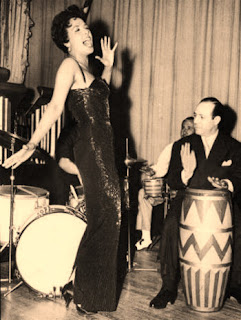Lena Horne, the enchanting jazz singer and actress who reviled the bigotry that allowed her to entertain white audiences but not socialize with them, slowing her rise to Broadway superstardom, has died. She was 92. ...
Horne, whose striking beauty and magnetic sex appeal often overshadowed her sultry voice, was remarkably candid about the underlying reason for her success.
"I was unique in that I was a kind of black that white people could accept," she once said. "I was their daydream. I had the worst kind of acceptance because it was never for how great I was or what I contributed. It was because of the way I looked."
In the 1940s, she was one of the first black performers hired to sing with a major white band, the first to play the Copacabana nightclub and among a handful with a Hollywood contract.
In 1943, MGM Studios loaned her to 20th Century-Fox to play the role of Selina Rogers in the all-black movie musical "Stormy Weather." Her rendition of the title song became a major hit and her signature piece.
More from the NYT:
Ms. Horne might have become a major movie star, but she was born 50 years too early, and languished at MGM in the 1940s because of the color of her skin, although she was so light-skinned that, when she was a child, other black children had taunted her, accusing her of having a “white daddy.” ...
When she was 16, her mother abruptly pulled her out of school to audition for the dance chorus at the Cotton Club, the famous Harlem nightclub where the customers were white, the barely dressed dancers were light-skinned blacks, Duke Ellington was the star of the show and the proprietors were gangsters. A year after joining the Cotton Club chorus she made her Broadway debut, performing a voodoo dance in the short-lived show “Dance With Your Gods” in 1934.
And concluding from the AP link above.
By the 1960s, Horne was one of the most visible celebrities in the civil rights movement, once throwing a lamp at a customer who made a racial slur in a Beverly Hills restaurant and in 1963 joining 250,000 others in the March on Washington when Martin Luther King Jr. gave his "I Have a Dream" speech. Horne also spoke at a rally that same year with another civil rights leader, Medgar Evers, just days before his assassination. ...
She had married MGM music director Lennie Hayton, a white man, in Paris in 1947 after her first overseas engagements in France and England. An earlier marriage to Louis J. Jones had ended in divorce in 1944 after producing daughter Gail and a son, Teddy.
In the 2009 biography "Stormy Weather," author James Gavin recounts that when Horne was asked by a lover why she'd married a white man, she replied: "To get even with him."
Her father, her son and her husband, Hayton, all died in 1970 and 1971, and the grief-stricken singer secluded herself, refusing to perform or even see anyone but her closest friends. One of them, comedian Alan King, took months persuading her to return to the stage, with results that surprised her.
"I looked out and saw a family of brothers and sisters," she said. "It was a long time, but when it came I truly began to live."
And she discovered that time had mellowed her bitterness.
"I wouldn't trade my life for anything," she said, "because being black made me understand."

No comments:
Post a Comment
What do you think?